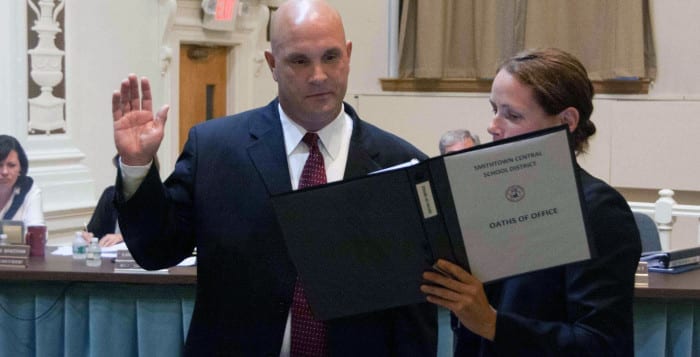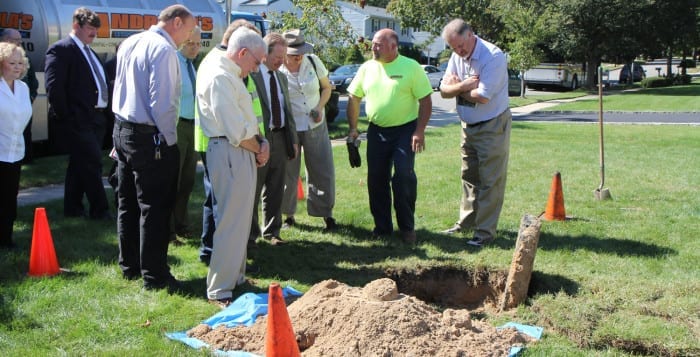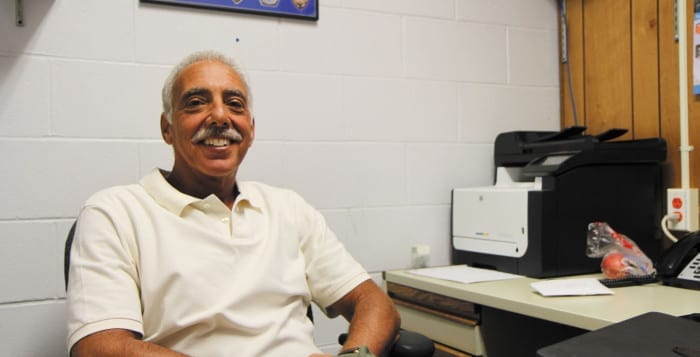Bruckenthal retires Saturday, Lt. Bill Ricca to take helm
Northport Village Police Chief Ric Bruckenthal will be retiring on Saturday, Sept. 26, ending a career of nearly four decades of policing the village’s streets.
Lieutenant Bill Ricca will be taking over at the helm. The lieutenant said he is looking forward to continuing the chief’s work.
“He’s done such a great job here; he’s made this a model department,” Ricca said in a recent sit-down interview. “[There will] be very few changes when I take over.”
Bruckenthal, 62, has spent 37 of his 39 years in law enforcement at Northport Village Police Department. He has been chief for the last 15 years, after working his way up the ladder. He began his career as an officer and rose to sergeant and then lieutenant. He resides in Northport with his wife Patricia, and they had four kids, Noa Beth, Nathan, Matthew and Michael. Nathan was killed in action in Iraq as a coastguardsman in 2004.
Bruckenthal grew up in Queens. He graduated from Queens College and then attended John Jay College, where he received his bachelor’s degree in criminal justice and police science. From there, he took the first police job he was offered, in Asharoken Village.
“It was very quiet, and in the winter it was dead,” the chief said. “I wanted a little more activity. So in 1978, I had the opportunity to come here. Northport then was a lot different than it is today.”
He said that downtown Northport used to have a “tremendous” number of bars. Bruckenthal said with a laugh that there were quite a number of bar fights back then, but that has changed due to a big decrease in the number of bars in the village now. While he doesn’t know why the dynamic of Northport has changed, he thinks it has to do with more and more people realizing that Northport is a unique spot.
“That has changed the environment here,” he said.
Bruckenthal said being involved with the community is the best way to run a successful police department.
“I really believe interacting with people, just talking with people and getting out of the police car, is the best police work you can do. It’s a small department, so I try to encourage the officers to tell me what they are interested in, so maybe we can do something with their interests that’s going to help the department and the community.”
For example, one officer under Bruckenthal’s command is a former Eagle Scout, so he attends all the Eagle Scout presentations. Other officers interact with the schools in Northport, because they have children that are in all the different schools within the district. He thinks this management strategy helps connect cops to their community.
Bruckenthal has enjoyed working with the administration at Northport Village Hall and said “they really do have the community and the village in their best interests.”
Henry Tobin, deputy mayor of Northport Village, said that Bruckenthal would be deeply missed.
“One reason Ric has been loved by the village and supported so strongly through tough times is because the people know he has no personal agenda,” Tobin said in a phone interview. “He is motivated by what is best for the village.”
Tobin acknowledges that the village is fortunate, however, to be gaining a chief in Ricca.
“He is a deeply felt member of the community. He is dedicated to public service, fairness and empathy,” he said.
In terms of improvements he’s made to the department, Bruckenthal touted a number.
“I think we’ve better trained our people in first aid, CPR, and AEDs (automatic external defibrillators),” Bruckenthal said. “That was always something I thought was very important. I was the first EMT in the department. We handle a significant amount of aided cases. If you can help the person more than just saying, ‘hurry up with the ambulance,’ I always thought that was important.”
Bruckenthal and Ricca have both personally made several saves using CPR, which they consider highlights of their careers.
Ricca, 49, has been a part of the department for 24 years. He and his wife Dawn have five kids: Joe, Nicole, Dominic, Angelina and Steven. Ricca worked as a police officer in New York City with the K-9 Unit, with canine partners Sparky and Sherlock. Sparky was a German Shepherd and Sherlock was a bloodhound.
“The dogs and you are a team,” Ricca said. “Your dogs come home with you. It was probably the most fun I’ve had being a cop.”
In 1991, he came out to Northport as a police officer, and quickly became the firearms instructor for the department. He has taken on more responsibilities since then as the department trainer.
“In a small department like this, when an opportunity comes around here to do something specialized, you’re excited to grab it,” Ricca said. “Under Chief Bruckenthal, he’s been very aggressive in sending guys out to do training.”
Ricca has been taking over Bruckenthal’s duties and day-to-day activities for a few weeks now, and once he officially becomes chief on Sept. 27, he will fully take over administrative duties at the department. He doesn’t think the Northport Village Board will replace him with a new lieutenant immediately after he is promoted.
When asked why he was first interested in becoming the new chief, Ricca said, “I was always an ambitious person. I never sat down and said ‘good enough.’ I think I make a good leader.”
Ricca thoroughly enjoys working in Northport.
“I love to be a cop where I live,” he said. “I walk downtown almost daily and stick my head into the stores, say hello to the store owners, say hello to the shoppers. It makes my day, it’s my favorite part of working with the police department in Northport.”
Ricca hopes to build an even stronger bond with the community as chief, with potential events like coffee with a cop.
“We can’t do this job ourselves. We can answer calls and catch bad guys, but we need their support. We do public service 90 percent of the time. And we don’t want the people to be afraid to call us.”













